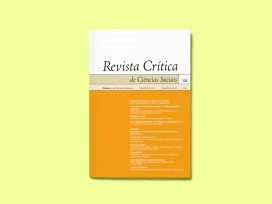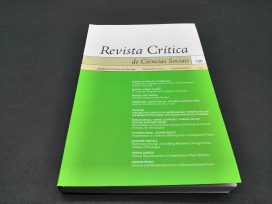Abstracts Revista Crítica 76 (2006)
Miguel Vale de Almeida
Same-sex marriage. On “distant and strange people” in a “decent society”
This paper presents a first reflection on the data of a research study carried out in Barcelona. The public debate on same-sex marriage reveals social tensions around issues of gender, sexuality, conjugality, procreation, and parenthood. The symbolic representations and ideological discourses on these issues show their constructed character when a single variable – the sex of the spouses – presents itself as changeable. This process brings to light the deep structure of homophobia as reactive motivation, the politicized character of the scientific discourses used in the debate, and the differences in the cultures of the identity politics in the different nation-states.
Sasha Roseneil
Living and loving beyond the heteronorm: A queer analysis of personal relationships in the twenty-first century
This paper seeks to develop a queer approach to the study of personal relationships. In the context of the significant transformations in the organization of personal life which have taken place over the past thirty years, it argues that sociologists must de-centre the family and the heterosexual couple in our intellectual imaginaries. The paper first provides a critique of sociology for the heteronormative frameworks within which it has studied personal relationships. It then goes on to propose an extension of the framework for the analysis of contemporary transformations of intimacy, arguing for the importance of a queer analysis of social change, and suggests that there is a need for research focusing on those living at the cutting edge of social change. It ends with an overview of the findings of recent research on the relationship practices of those who are living and loving beyond the heteronorm.
Gabriela Moita
The pathology of sexual diversity: Homophobia in clinicians’ discourse
The author presents and analyzes the attitudes of mental health practitioners whose models of reading are still based on the pathological paradigm of homosexuality. The material presented in this paper is the result of an analysis of discourses produced within discussion groups (organized for research purposes) that included psychiatrists and psychologists as well as gays and lesbians who had gone through processes of therapeutic treatment (for a number of reasons, and not only because of issues related to homosexuality). The levels of homophobia and heterosexism that continue to subsist in the Portuguese clinical context reveal both compliance with unquestioned models of training, and the difficulty that gays and lesbians may face in a process that perpetuates – and may even increase – the social discrimination that affects them.
Nuno Santos Carneiro, Isabel Menezes
“From ring to wedding band”: The sense of equals and personal emancipation in the psychology of sexualities
Systematizing some of the processes that underlie the psychological development of (sexual) identity, this paper proposes a Critical Psychosocial Analysis of contemporary sexualities. The authors underline the experiential sharing of oppression in contexts of “equals” as the nuclear dimension of the development of identity. They further argue that this sharing potentiates a conceptual conciliation between the psychological approach to sexual identities and queer proposals regarding sexualities. In conclusion, the authors discuss the implications of this conciliation for the development of the subject in the multiple contexts of relational negotiation of “minority” sexualities, emphasizing the psychological complexity that is needed for personal emancipation within these contexts.
Ana Cristina Santos
Between academia and activism: Sociology, queer studies, and the LGBT movement in Portugal
This paper focuses on the diverse and complementary character of the relationship between academia and social movements, which moulds a social-analytic construct whose implications for queer studies remain largely untheorized. I believe that such theorization can lead to a new application of action research, now centred on the hyphens that allow us to dialectically articulate the knowledges constructed in the daily contexts of academia and of LGBT activism. In effect, if academia resists the temptation of paternalism, futurism, and cannibalization, and social movements resist accommodation, embourgeoisement and capitulation, then scholarship and activism, by cooperating horizontally, can become cornerstones of this construct. Anchored on reciprocal and empowering recognitions, in which none of these forms of knowledge is unique or dominant, this construct can lead to a new field of knowledge, which I call public queer studies.
António Fernando Cascais
Different like us. Portuguese LGBT associations in three tempos
This paper centres on the way in which the Portuguese social formation has determined and manifested itself in the socio-genesis of LGBT associations in the last three decades. It is possible to establish a three-stage periodization which has primarily a heuristic value: the first stage, from 1974 to 1991, can be divided into two phases, before and after the appearance of the AIDS epidemic in Portugal; the second, between 1990-1991 and 1995-1997; and the third, from 1997 until now. The production of knowledge on LGBT associations has to be interconnected with two further lines of enquiry: one on its old and new detractors and opponents, and the other on the community that the associations represent or that emerges from them, with a history, an identity, and a culture that explain the reasons for adherence or resistance to them.
Michael O’Rourke
What’s so queer about the queer theory to-come?
This paper unpacks a number of the key terms which have preoccupied Jacques Derrida, after his so-called religio-ethico-political turn, from Force of Law (1989) to Voyous (2004): “autoimmunity”, “messianicity without messianism”, “arrivance”, and “democracy to-come”, among others. I discuss Derrida’s later texts, especially Voyous/Rogues, which I argue ought to become an important charter for a queer theory that is futurally envisaged, alongside the recent Social Text issue, “What’s Queer about Queer Studies Now?” (edited by David L. Eng, Judith Halberstam, and José E. Muñoz, 2005) and Judith Butler’s more recent work (especially Giving an Account of Oneself, 2005). I suggest that autoimmunization, a somewhat new and ambiguous (and often negatively understood) term in the Derridean lexicon, offers a useful starting point for thinking about the undeterminable, monstrous, even roguish future of queer studies, or what I call the queer theory to-come.
Published 4 May 2007
Original in Portuguese
Contributed by Revista Crítica de Ciências Sociais © Revista Crítica de Ciências Sociais Eurozine
PDF/PRINTNewsletter
Subscribe to know what’s worth thinking about.



